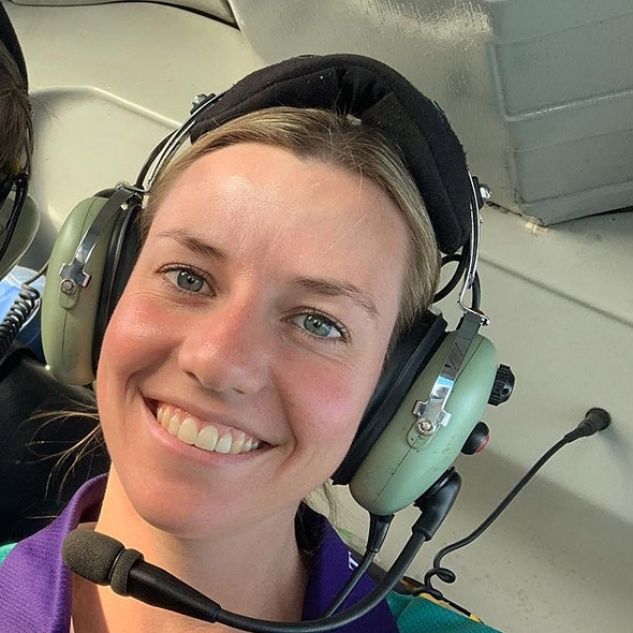Written By
Nicolette Ward
College
College of Healthcare Sciences
Publish Date
17 November 2021
Related Study Areas
Following a passion to paradise
JCU Alumni Emma Trimble is living the island dream. For the past four years she has been working as a regional resource speech pathologist for schools throughout the Torres Strait and Cape York Peninsula.
I work across two colleges - Tagai State College, which consists of 16 primary campuses and one secondary campus located on islands throughout the Torres Strait, and Northern Peninsula Area State College which has two primary campuses and one secondary campus located in Bamaga at the tip of Cape York. I support 20 schools in total, which means I get to do a lot of travel by small plane and helicopter.
I’m based on Thursday Island and usually do outreach two or three days a week. It’s a great lifestyle, and a very social, tight knit community.


A diverse degree
Working in such a large number of school campuses sees Emma take on a whole classroom approach to tackling students with speech and language issues.
My role focuses on providing in-class support to students by adjusting the language content and delivery of the curriculum, rather than taking them out of the classroom for individual therapy. I also work closely with teachers and the wider school staff to support students experiencing speech-language communication difficulties. We also use a range of assistive technologies to support students in accessing the curriculum in different ways when required.
With the little ones, it is great to identify them early in order to make some big gains with their speech and language development. And with the high school students, helping with their literacy abilities can really boost their confidence and make them feel more comfortable which is so important for their social peer interactions.
And then we also have a number of students with diagnosed disabilities, some of whom have reduced verbal communication abilities. So it's really fantastic to be able to support them and their families with various methods of communication, whether it be through key word signs, visuals or other high-tech devices. Being able to give these students a voice is extremely rewarding.
Importantly, building confidence in language skills can also impact strongly on literacy outcomes, particularly in regard to reading.
Oral language forms the foundation of the reading and writing skills children develop as they progress through their schooling. Most students I work with speak Standard Australian English as an additional language, which is an important factor to consider in terms of their early speech and language development.
I also need to be aware of speech sound and language structure differences between traditional languages, Torres Strait Creole and Standard Australian English. For example, some students may have difficulties with particular speech sounds in Standard Australian English but there may be other culturally appropriate sound substitutions. And similarly with language aspects such as grammar and syntax, which can also be very different. In these cases, it’s important to recognise that it is not necessarily a language disorder, but more of a language difference.
Emma’s passion for working within schools was sparked from an eight-week student placement experience she had in her fourth year of speech pathology studies at JCU.
My interest in working with Indigenous communities really began to grow after my placement at a school in Katherine in the Northern Territory. I became particularly interested in working with students who were at risk of disengaging from school often because of poor language proficiency, and really enjoyed the challenge of building rapport with these students.
During my time at JCU, we got to experience a wide range of both paediatric and adult clinical practice settings, including schools, home and community care, hospitals and aged-care homes. We were also able to participate in observational clinics working with adults, children and even new born babies presenting with feeding difficulties. There really is so much diversity to a career in speech pathology.
The North Queensland experience
Another highlight of Emma’s JCU studies was the opportunity to live on the Townsville campus in purpose-built student accommodation.
I’m from Cairns and entered university as a school leaver, so it was great being able to live on campus at St Mark’s College for the duration of my degree. I absolutely loved it and made many close friendships who I'm still in contact with today. There was also lots of sporting and social events going on which made it easy to meet people outside of your degree as well. Looking back, I am definitely glad I had that experience.
For anyone considering a career in speech pathology at JCU, Emma says there has never been a better time to do it.
Speech pathology is definitely an area of growing need, especially with the National Disability Insurance Scheme putting extra demand on private providers of speech pathology services.
JCU really values making a difference to regional and remote communities, and I find the work I do across the Torres Strait and Northern Peninsula Area to be meaningful and rewarding. Communication is such an essential part of life, so it’s great to be so it’s great to be able to support students in setting them up for future success.